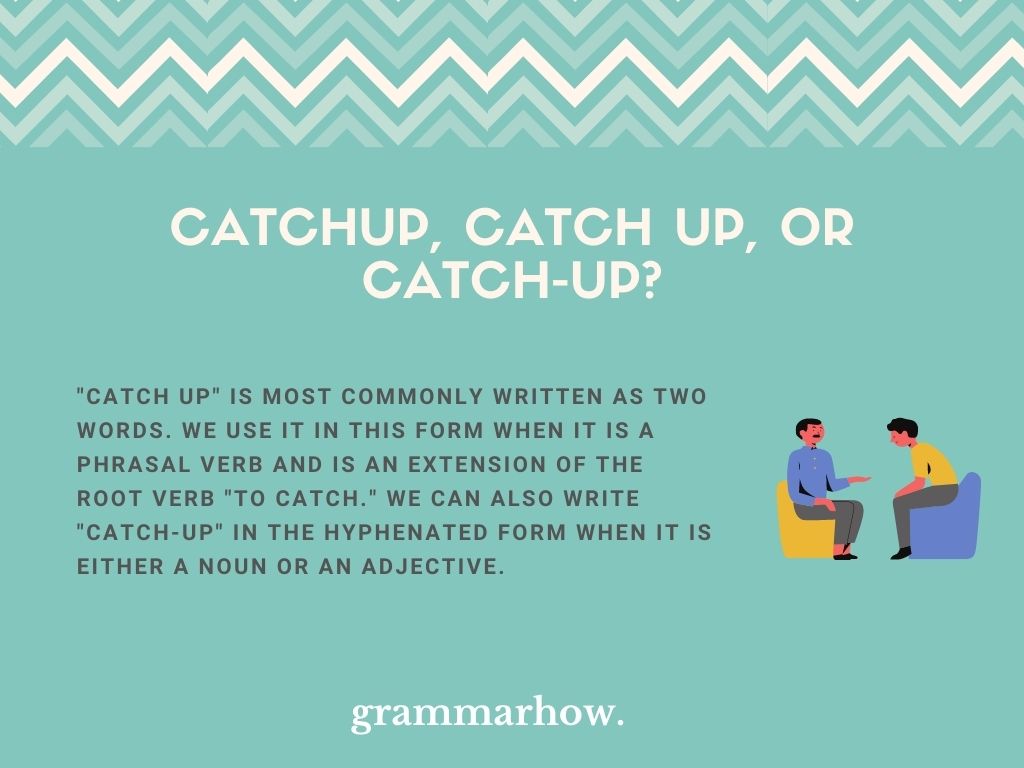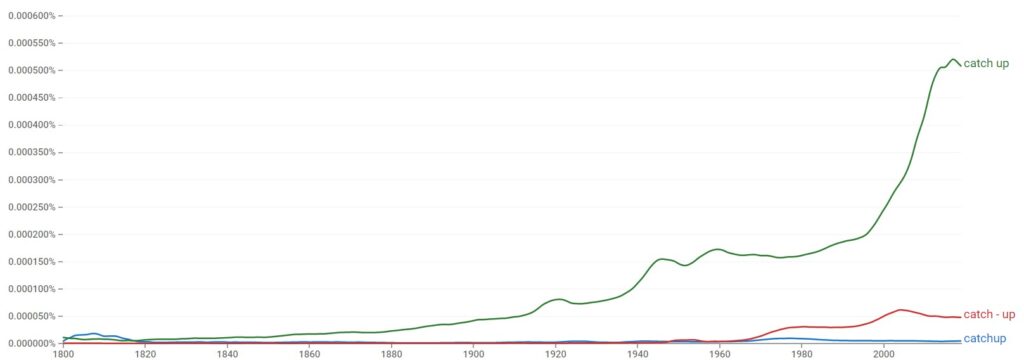When using “catch up” as either a verb or noun, it would help to know how to spell it. That’s where this article comes in. We’ll teach you whether it’s written as one or two words or whether the hyphenated form of “catch-up” is sufficient.
Catch up vs. Catch-up vs. Catchup
“Catch up” is most commonly written as two words. We use it in this form when it is a phrasal verb and is an extension of the root verb “to catch.” We can also write “catch-up” in the hyphenated form when it is either a noun or an adjective.

According to Google Ngram Viewer, “catch up” is the most popular choice of the three. This shows that you are more likely to come across the phrasal verb in English than any other variation.

In The Cambridge Dictionary and The Oxford Dictionary, “catch up” is defined clearly by both as a phrasal verb. They both mention that it comes from the root “to catch” and that the two-word variation is appropriate in this way.
Both dictionaries also mention the hyphenated form of “catch-up.” They write that it is correct as a noun or adjective when it is modifying another noun in the sentence.
These examples might help you to figure out the key differences.
- Adjective: The catch-up channel is off-air for a little while.
- Verb: If you’re going to catch up with her, you’ll want to leave now.
Is “Catchup” One Word?
“Catchup” should never be written as one word. While it is appropriate to write it as two words or as a hyphen form, the one-word variation does not work in any case. We need to make sure there is a key difference between “catch” and “up” when writing them.
Perhaps these examples will help you to figure out what we mean:
- Correct: If you’re going to catch up with me on the leaderboard, you’ll want to work harder.
- Incorrect: He’s never going to catchup at this rate!
- Correct: I thought the catch-up episode was well worth the watch.
- Incorrect: I’m not here to play catchup with you!
Is “Catch up” Two Words?
“Catch up” is correct as two words when we use it to demonstrate an action. In this way, it is known as a phrasal verb, which shows that someone is trying to “catch up” with another person or thing. It cannot be used to modify anything else in the sentence.
You might benefit from checking these examples out to see how it works:
- If you’re not going to catch up with him, why did you even bother trying?
- I’ll have to catch up with you another time! I’m a bit too busy right now.
- You should catch up with her! I think she really misses you, and that would make her happy.
- If you wanted to catch up with them, maybe you should have started moving sooner!
Is “Catch-up” Hyphenated?
“Catch-up” is correct as a hyphenated form when we use it as a noun or adjective. In this way, we can group the two words to show that they are modifying another noun at some point in the sentence. “Catch-up” also works as a standalone noun with no modification.
We can refer to the AP Stylebook when we want to learn more about hyphen rules. According to AP Style, hyphens link multiple words together when they are used to modify the same noun.
So, if we take “catch-up” and add the noun “television” after it, it would make sense to hyphenate them to show how the modifiers work.
Check these examples out if you’re not sure how to make it work:
- If you’re interested in playing catch-up with her, maybe you should see if she’s into it.
- The catch-up television channels are always so boring.
- We’re in a bit of a catch-up phase at the moment, and things are moving quite slowly.
- I didn’t want to play catch-up, but I suppose I have no other choice!
Is “Up” Capitalized In The Word “Catch-Up”?
“Catch-up” is not a proper noun. You do not need to capitalize either part of the hyphenated form due to this.
If you choose to include it in a title, you might find it useful to capitalize both “catch” and “up.” This only applies if your title features every other word in its capitalized form, though.

Martin holds a Master’s degree in Finance and International Business. He has six years of experience in professional communication with clients, executives, and colleagues. Furthermore, he has teaching experience from Aarhus University. Martin has been featured as an expert in communication and teaching on Forbes and Shopify. Read more about Martin here.
